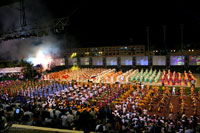 Rukshana Nanayakkara is the Senior Programme Coordinator for South Asia at Transparency International. The following article was first published in the Sunday edition of Ceylon Today on 20 November.
Rukshana Nanayakkara is the Senior Programme Coordinator for South Asia at Transparency International. The following article was first published in the Sunday edition of Ceylon Today on 20 November.
For Sri Lankans, last Saturday dawned with the news of Sri Lanka losing its bid to host the 2018 Commonwealth Games to Australia. While my deeply instilled national pride was bruised by the news, a sense of relief engulfed my mind. This appears to have an echo in the minds of many others in the country, if the comments of a popular online newspaper and Facebook comments of my friends are anything to go by.

photo: Flickr/Gerald Yuvallos
This relief doused the uncertainty. The uncertainty, which led some Sri Lankan minds to question the necessity of the whole bid, the venue, the finances involved, the ability to control possible waste and corruption, which had often been the case in recent similar events in India and Indonesia. While this line of thinking could easily bestow me the honorary title of ‘traitor,’ as a Sri Lankan I yearn to sooth the bruises on my national pride beyond winning the next possible bid for another mega sporting event or international beauty pageant in Sri Lanka (one should never be surprised!).
On top of the losing bid, these un-nursed bruises were recently revisited by twin events: an experience and a statement, of two persons both who I consider important in my life. One is a friend who belongs to a minority ethnic/religious group in Sri Lanka. (no..not a Tamil/Hindu) This young man with a promising future was recently selected for a foreign scholarship from Sri Lanka. When we met last month, he told me of a group session during his orientation, where he was subjected to a certain amount of humiliation in the eyes of the others. In summary the group work was an exercise to narrate the perception of participating countries by others using both words and symbols on a paper. Yet in 2011 the Sri Lankan turn of narration was a picture of fleeing refugees, discrimination, corruption, political violence and looming war crime charges … not to mention the symbols.
The second was a statement made by the President of my country, Mahinda Rajapaksa, at a prize giving event of popular girls’ schools in Colombo. As reported, his statement was “making statement condemning one’s own motherland abroad, is not a feature of a worthy citizen.”
Both the experience and the statement re-bruised my national pride for different reasons. The first was a regrettable picture which I often gather, a narration I often hear for obvious reasons which Sri Lankans are not unaccustomed to. While the scale and gravity of the picture or narration could vary based on different reasons in different circumstances (no political reasons involved…!), this brings up many unanswered questions of my generation to the surface, which are pointers in scaling the international stature of the country.
The latter is a qualification I stand to inherit with the statement of the president. I ponder whether I am truly unworthy as I often use the democratic tool of critically evaluating the performance of my national trustee (in other words the government!). may it be in a local or international forum.
My friend has stood for what is expected from a worthy citizen from the President. Amidst marred negativity he fought for national pride signifying the positive aspects of Sri Lankan life and the county. Yet we both agreed that the substantive issues are at the mercy of the arms of the government. What he and I can do, create ripples to demand better governance. So would talking about it make me unworthy or would it be of great value to a democratic nation – freedom of expression, which Sri Lanka can really be proud of beyond its national territory.
Winning the commonwealth bid would have carried many factors to its advantage and at the same time dredged up many questions. At an international level, did Sri Lanka project a competing image? Or to be precise, do we have effective counter measures to deal with wastage and corruption which had been common malpractices in similar events in our neighbourhood. The preparations for the recently launched South East Asian Games have seen many allegation of corruption. A senior politician of the ruling Indonesian party has been accused of taking bribes worth of millions in awarding contracts to build the athletes’ rooms. Although he has consistently denied the allegations, the scandal has cast a dubious spell on the game and the country.
According to the BBC, the organisers have admitted that the corruption scandal has impacted on the ability to host a successful game. Although India has witnessed a similar plight in its commonwealth game constructions last year, it is now at least being talked as a positive story with the jailing of the culprit. Then the resounding question is, have we Sri Lankans been able to fry the big fish to assure clear governance, transparency and accountability to earn any praise.
So I would say the journey for better governance would make anyone an unworthy citizen of a worthy cause.















 Connect with us on Facebook
Connect with us on Facebook Follow us on Twitter
Follow us on Twitter